外研版(2019)选择性必修第一册Unit 2Onwards and upwards Developing ideas课件(共37张PPT)
文档属性
| 名称 | 外研版(2019)选择性必修第一册Unit 2Onwards and upwards Developing ideas课件(共37张PPT) | 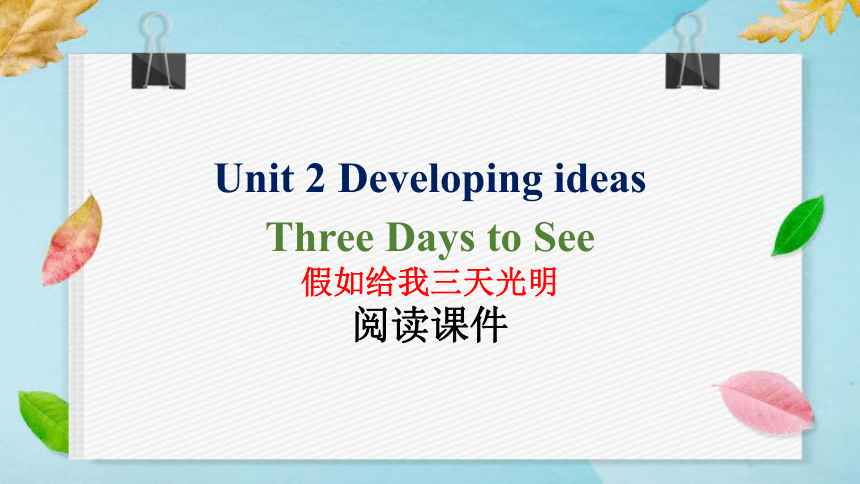 | |
| 格式 | pptx | ||
| 文件大小 | 15.0MB | ||
| 资源类型 | 教案 | ||
| 版本资源 | 外研版(2019) | ||
| 科目 | 英语 | ||
| 更新时间 | 2024-10-11 15:17:41 | ||
图片预览

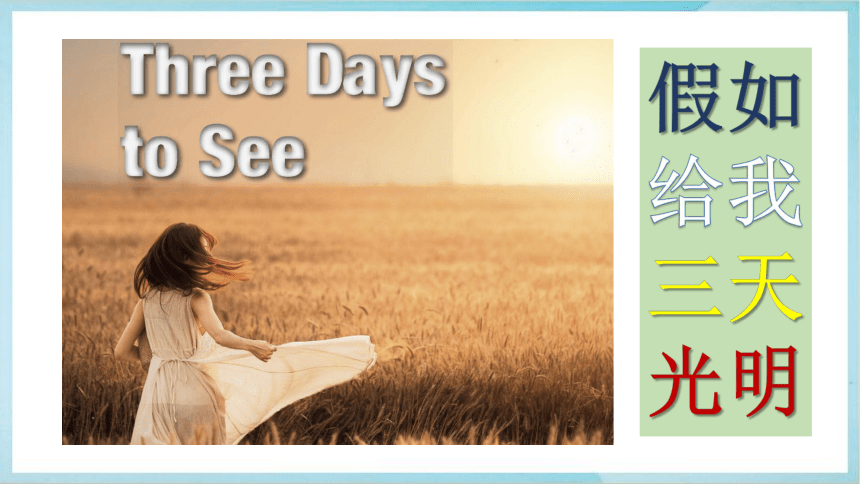
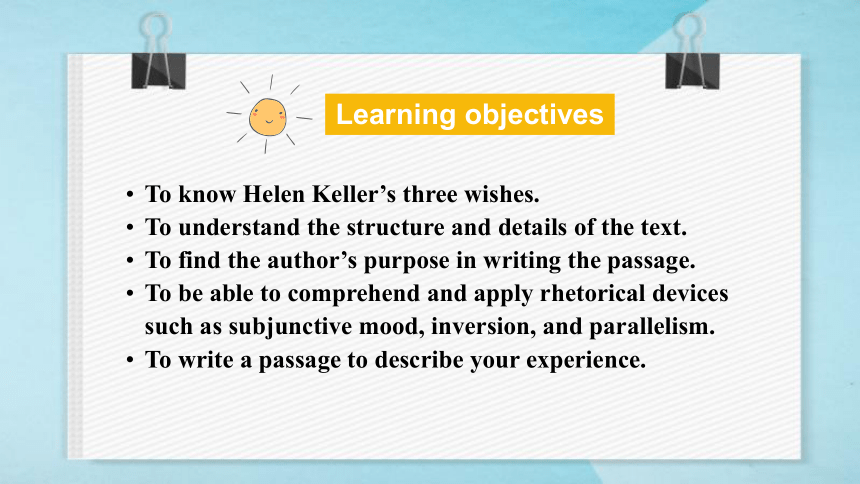
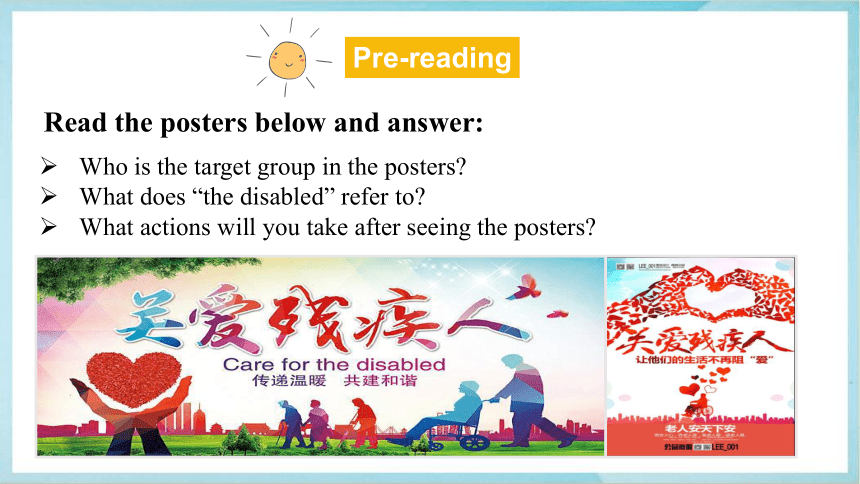
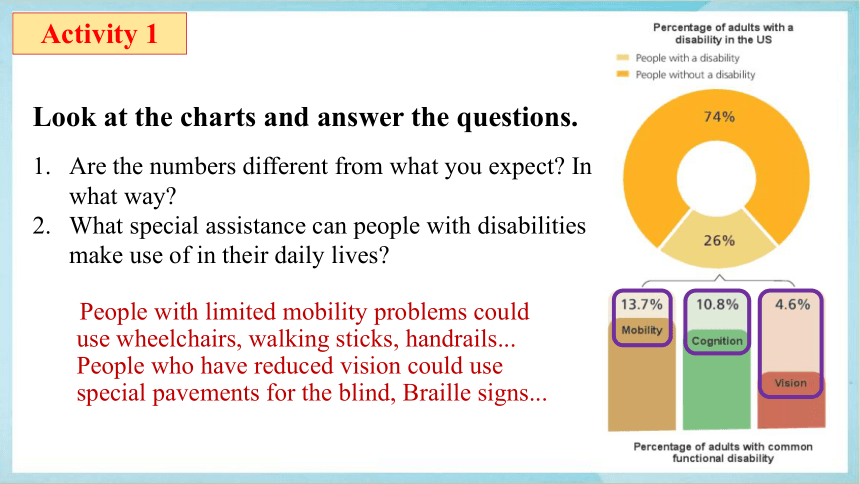

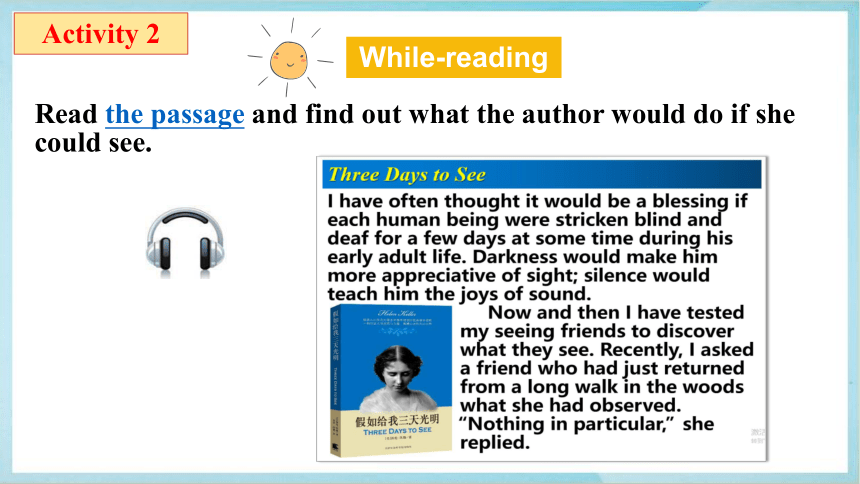
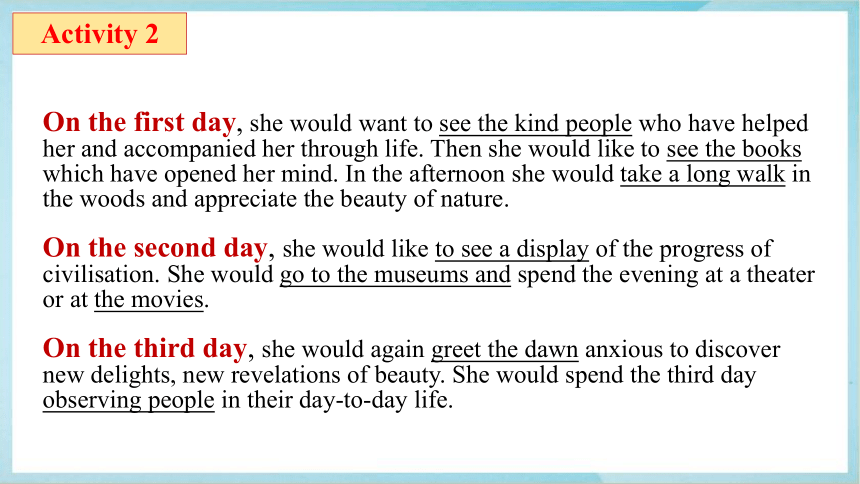
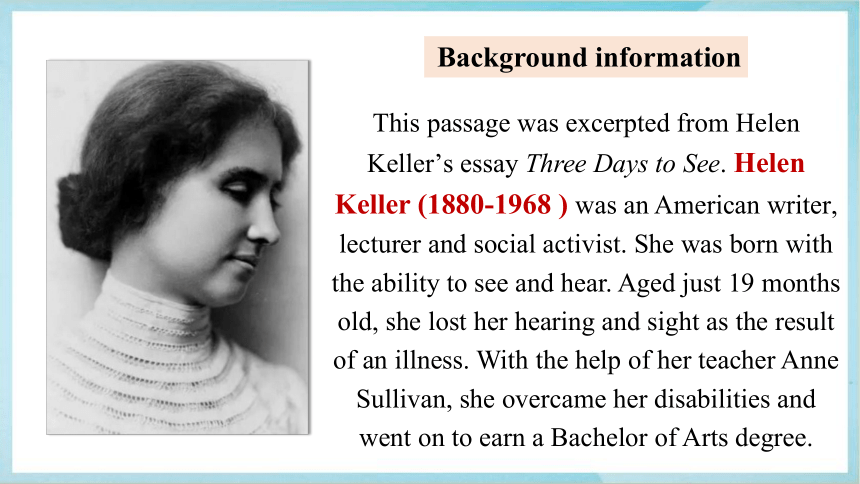
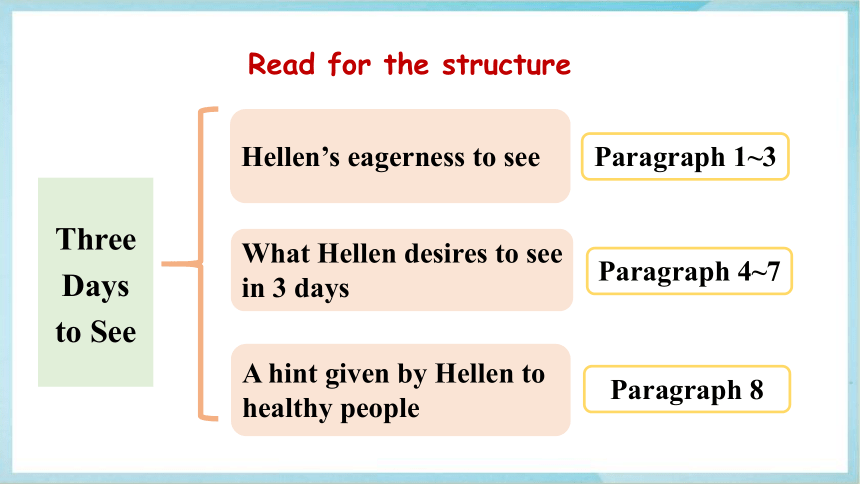
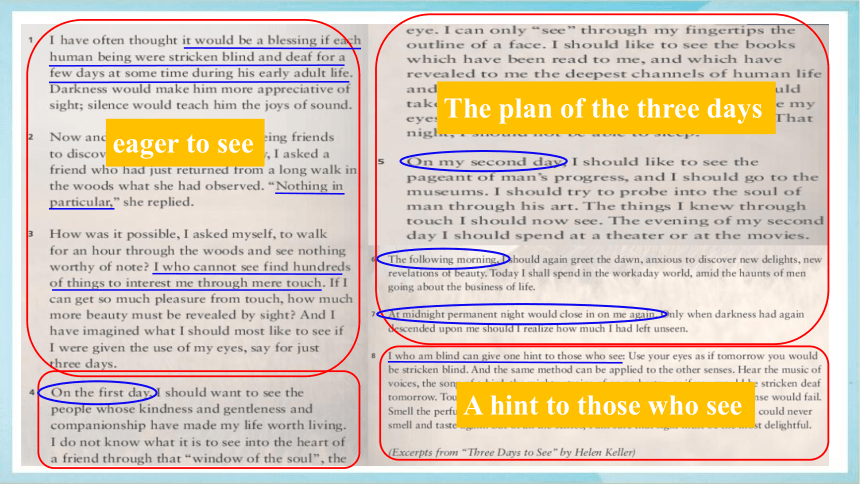
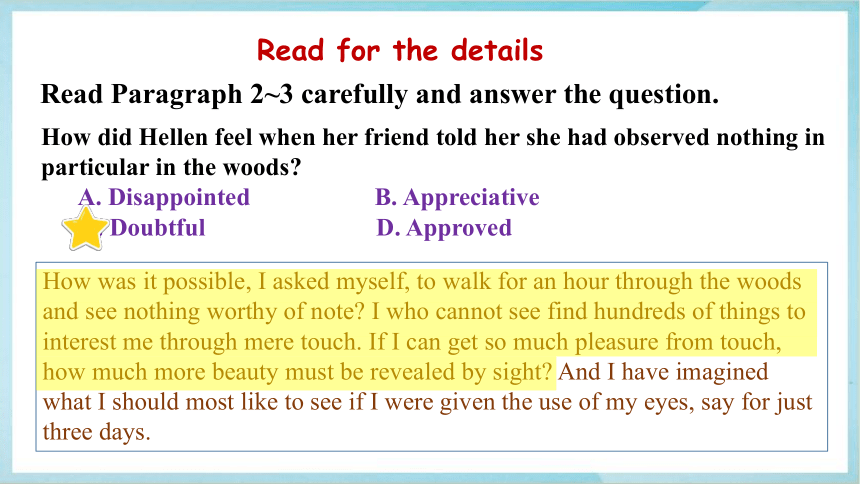
文档简介
(共37张PPT)
Unit 2 Developing ideas
Three Days to See
假如给我三天光明
阅读课件
假如给我三天光明
To know Helen Keller’s three wishes.
To understand the structure and details of the text.
To find the author’s purpose in writing the passage.
To be able to comprehend and apply rhetorical devices such as subjunctive mood, inversion, and parallelism.
To write a passage to describe your experience.
Learning objectives
Read the posters below and answer:
Who is the target group in the posters
What does “the disabled” refer to
What actions will you take after seeing the posters
Pre-reading
Look at the charts and answer the questions.
Are the numbers different from what you expect In what way
What special assistance can people with disabilities make use of in their daily lives
People with limited mobility problems could
use wheelchairs, walking sticks, handrails...
People who have reduced vision could use
special pavements for the blind, Braille signs...
Activity 1
How do you learn to speak if you can't see and you can't hear
Helen Keller gives us the perfect answer.
Read the passage and find out what the author would do if she could see.
Activity 2
While-reading
On the first day, she would want to see the kind people who have helped her and accompanied her through life. Then she would like to see the books which have opened her mind. In the afternoon she would take a long walk in the woods and appreciate the beauty of nature.
On the second day, she would like to see a display of the progress of civilisation. She would go to the museums and spend the evening at a theater or at the movies.
On the third day, she would again greet the dawn anxious to discover new delights, new revelations of beauty. She would spend the third day observing people in their day-to-day life.
Activity 2
Background information
This passage was excerpted from Helen Keller’s essay Three Days to See. Helen Keller (1880-1968 ) was an American writer, lecturer and social activist. She was born with the ability to see and hear. Aged just 19 months old, she lost her hearing and sight as the result of an illness. With the help of her teacher Anne Sullivan, she overcame her disabilities and went on to earn a Bachelor of Arts degree.
Three Days
to See
Hellen’s eagerness to see
A hint given by Hellen to healthy people
Paragraph 1~3
Paragraph 4~7
Paragraph 8
What Hellen desires to see in 3 days
Read for the structure
eager to see
The plan of the three days
A hint to those who see
Read Paragraph 2~3 carefully and answer the question.
How did Hellen feel when her friend told her she had observed nothing in particular in the woods
A. Disappointed B. Appreciative
C. Doubtful D. Approved
How was it possible, I asked myself, to walk for an hour through the woods and see nothing worthy of note I who cannot see find hundreds of things to interest me through mere touch. If I can get so much pleasure from touch, how much more beauty must be revealed by sight And I have imagined what I should most like to see if I were given the use of my eyes, say for just three days.
Read for the details
Read Paragraph 4~7 carefully and find out what the author would do if she could see.
On the first day
On the second day
On the third day
She would want to see the kind people who have helped her and accompanied her through life. Then she would like to see the books which have opened her mind. In the afternoon, she would take a long walk in the woods and appreciate the beauty of nature.
She would like to see a display of the progress of civilisation. She would go to the museums and spend the evening at a theater or at the movies.
She would again greet the dawn, anxious to discover new delights, new revelations of beauty. She would spend the third day observing people in their day-to-day life.
Read Paragraph 8 carefully and answer the question.
What does the hint given by Hellen suggest
Treasure your senses and make the best of them
Sight is the most delightful sense
Live every day to the full
Make the best of your sight
Choose the author's purpose in writing the passage and give your reasons.
1 To help readers understand what it is like to be blind.
2 To make readers without disabilities appreciate what they have.
3 To persuade readers to care about the blind.
Activity 3
Post-reading
Think & Share
1.What are the main wishes of the author Give an example.
2.Do you know of any stories about people with disabilities Share one.
3.How should we interact with people with disabilities
4.What qualities do both reading passages in this unit convey
1. What are the main wishes of the author Give an example.
2. Do you know of any stories about people with disabilities Share one.
The author would like to be able to see for three days. She would like to be able to see the people who have helped her and with whom she spends her time. she would like to see the books she has read.
Think & Share
3. How should we interact with people with disabilities
4. What qualities do both reading passages in this unit convey
Facing difficulties and setbacks in life with a positive attitude.
Think & Share
Read the sentences from the passage and answer the questions.
Use your eyes as if tomorrow you would be stricken blind. And the same
method can be applied to the other senses. Hear the music of voices, the
song of a bird, the mighty strains of an orchestra, as if you would be
stricken deaf tomorrow. Touch each object you want to touch as if
tomorrow your tactile sense would fail.
1 What sentence structure is used repeatedly What figure of speech is it
2 How does this technique help to express the author’s emotions
Activity 4
Parallelism as a literary device is the use of expressions, clauses or sentences that are similar in their structure. It can make the content more rhythmic, engaging and easier to remember. It is commonly used in literary works and speeches.
Learning to learn
1 What sentence structure is used repeatedly What figure of speech is it
A similar structure is used repeatedly. Namely, “Use... as
if... Hear... as if... Touch... as if...”. It’s parallelism.
2 How does this technique help to express the author’s emotions
The use of parallelism in speech or writing allows speakers or writers to maintain a consistency within their work and creates a balanced flow of ideas. Moreover, parallelism can be used as a tool for persuasion.
Activity 4
Now make your own sentences using this technique.
______________________________________________________
______________________________________________________
______________________________________________________
______________________________________________________
______________________________________________________
______________________________________________________
________________________________________
________________________________________
________________________________________________
Activity 4
Work in groups. Give a talk about your opinion on the sentence from the passage.
... it would be a blessing if each human being were stricken blind and deaf for a few days at some time during his early adult life.
1 Read and discuss the meaning of the sentence and decide whether you agree or disagree with it.
Activity 5
Point of view
Arguments
Supporting examples
2 Organise your talk and make notes.
3 Give your talk to the class.
Activity 5
Writing about an experience
When you dine out, do you prefer to choose a restaurant with bright light or dim one What’s the feeling if you dine at a “dark restaurant” It must be an extraordinary experience.
Activity 6
Read the passage and answer the questions.
Why did the author go to the “dark restaurant”
Because the author wanted to understand the experience
of being blind, thinking eating would be the most
difficult activity.
How did the author feel after finishing the meal
The author left the restaurant feeling hungry though
much more aware of the challenges that blind people face.
3. How did the author feel after finishing the meal
The author still felt hungry, and was much more aware of
the challenges that blind people face.
Read the passage and answer the questions.
Activity 6
Try to experience what it is like to have a disability and make notes.
Now write a short passage to describe your experience.
1 What kind of experience you had
____________________________________
2 What the most difficult thing was and why
____________________________________
3 How you overcame the difficulty
____________________________________
4 What you have learnt
_____________________________________
Activity 7
Work in pairs. Make improvements to each other's passages and share them with the class.
Activity 8
The Blind traveller
To experience how inconvenient life could be for a blind person, we’ll call some students to walk through some barriers with their eyes blindfolded.
Try to make notes of your experience and feeling.
Activity 7-8
Work in pairs. Make improvements to each other’s passages and share them with the class.
Today in class, we played a game called “the blind traveller”, in which one has to walk through some barriers with his eyes blindfolded. It is through this experience that I started to realise how inconvenient life could be for a blind person.
Not being able to see where I was going, I kept going off the path and turning in the wrong direction. What’s more, without the ability to accurately locate the position of the barriers, I often fell over them, even though I was moving at an extremely slow speed. And a loss of balance increased the difficulty of this short journey. After falling over more than ten times, I finally reached my destination on hands and knees.
Without sight, I couldn't even complete this short journey of no more than 15 metres smoothly, let alone overcome all the other various difficulties in daily life. I do realise that life must be much more challenging for the blind people.
Activity 7-8
今天在课堂上,我们玩了一个叫做“盲人旅行者”的游戏,在这个游戏中,一个人必须蒙着眼睛走过一些障碍。 正是通过这次经历,我开始意识到盲人的生活是多么不方便。
由于看不清自己要去哪里,我一直偏离小路,朝错误的方向转弯。 更重要的是,由于无法准确定位障碍物的位置,即使我以极慢的速度移动,我也经常会被它们绊倒。 失去平衡增加了这段短暂旅程的难度。 在跌倒了十多次之后,我终于用手和膝盖到达了目的地。
没有视力,我甚至不能顺利地完成这段不到15米的短途旅行,更不用说克服日常生活中的各种困难了。 我确实意识到盲人的生活一定更有挑战性。
One possible version
Work in pairs. Make improvements to each other’s passages and share them with the class.
Last winter holiday, my left leg was injured in a car accident, and for nearly one month I had to rely on crutches. It is through that experience that I started to realise how inconvenient life could be for a person with reduced mobility.
It took me much effort to adapt to walking with crutches on the flat ground. And it was even more painful to walk upstairs with them. Eventually, after a few days’ practice, I could go up and down stairs quite easily. But the difficulty which I failed to overcome was when standing up on a crowded bus. My loss of balance and the sudden stopping and starting of the bus often made me fall over.
One month in my life without the full use of both my legs was so difficult, it really made me appreciate the challenges of those for whom reduced mobility is permanent.
Activity 7-8
去年寒假,我的左腿在一场车祸中受伤,近一个月的时间里我不得不依靠拐杖。 正是通过那次经历,我开始意识到对于一个行动不便的人来说,生活是多么的不方便。
我费了很大劲才适应在平地上拄着拐杖走路。 和他们一起上楼就更痛苦了。 最后,经过几天的练习,我可以很轻松地上下楼梯了。 但我没能克服的困难是在拥挤的公共汽车上站起来的时候。 我失去平衡和公共汽车的突然启停经常使我摔倒。
在我的生命中有一个月不能完全使用我的双腿是如此的困难,这真的让我意识到那些永久性行动不便的人所面临的挑战。
Another possible version
1. Read the two points of view and explain their meanings in your own words.
If at first you don't succeed, try, try on and on.
2. Never succeed if you dare not let go because you are afraid of failure.
Thomas Edison
J.K. Rowling
J.D. Salinger
Emily Bronte
1. Perseverance is the key to success.
Do you agree with this opinion
2. Work in groups and decide which opinion you agree with more. Think of arguments to support your point of view and make notes.
If at first you don't succeed, set yourself another goal.
1. All roads lead to Rome.
2. The goal that suits you is the best.
3. When god closes a door, he opens a window.
Abraham Lincoln
Lu Xun
And this one Do you agree with it
Can you express your opinion Have a try!
2. Work in groups and decide which opinion you agree with more. Think of arguments to support your point of view and make notes.
You can prepare a debate with your classmates, try to present different attitude towards the topic.
3. Prepare for a debate. Consider the following:
1 the roles and responsibilities for each member of your group
2 your arguments, opening and summary
3 the opposing arguments you might face and how you can respond to them
4 useful words, expressions and structures
4. Team up with a group with the opposite point of view and hold the debate.
Reflection
Write a reflection after completing this unit. Consider the following:
1 What is your understanding of positive ways of facing frustration
2 What text types have you learnt about What are their features
3 What words, expressions and structures have you learnt
4 What improvement have you made in understanding different cultures
5 What improvement have you made in using learning strategies and exploring effective ways of learning
6 What improvement have you made in analysing and solving problems
Unit 2 Developing ideas
Three Days to See
假如给我三天光明
阅读课件
假如给我三天光明
To know Helen Keller’s three wishes.
To understand the structure and details of the text.
To find the author’s purpose in writing the passage.
To be able to comprehend and apply rhetorical devices such as subjunctive mood, inversion, and parallelism.
To write a passage to describe your experience.
Learning objectives
Read the posters below and answer:
Who is the target group in the posters
What does “the disabled” refer to
What actions will you take after seeing the posters
Pre-reading
Look at the charts and answer the questions.
Are the numbers different from what you expect In what way
What special assistance can people with disabilities make use of in their daily lives
People with limited mobility problems could
use wheelchairs, walking sticks, handrails...
People who have reduced vision could use
special pavements for the blind, Braille signs...
Activity 1
How do you learn to speak if you can't see and you can't hear
Helen Keller gives us the perfect answer.
Read the passage and find out what the author would do if she could see.
Activity 2
While-reading
On the first day, she would want to see the kind people who have helped her and accompanied her through life. Then she would like to see the books which have opened her mind. In the afternoon she would take a long walk in the woods and appreciate the beauty of nature.
On the second day, she would like to see a display of the progress of civilisation. She would go to the museums and spend the evening at a theater or at the movies.
On the third day, she would again greet the dawn anxious to discover new delights, new revelations of beauty. She would spend the third day observing people in their day-to-day life.
Activity 2
Background information
This passage was excerpted from Helen Keller’s essay Three Days to See. Helen Keller (1880-1968 ) was an American writer, lecturer and social activist. She was born with the ability to see and hear. Aged just 19 months old, she lost her hearing and sight as the result of an illness. With the help of her teacher Anne Sullivan, she overcame her disabilities and went on to earn a Bachelor of Arts degree.
Three Days
to See
Hellen’s eagerness to see
A hint given by Hellen to healthy people
Paragraph 1~3
Paragraph 4~7
Paragraph 8
What Hellen desires to see in 3 days
Read for the structure
eager to see
The plan of the three days
A hint to those who see
Read Paragraph 2~3 carefully and answer the question.
How did Hellen feel when her friend told her she had observed nothing in particular in the woods
A. Disappointed B. Appreciative
C. Doubtful D. Approved
How was it possible, I asked myself, to walk for an hour through the woods and see nothing worthy of note I who cannot see find hundreds of things to interest me through mere touch. If I can get so much pleasure from touch, how much more beauty must be revealed by sight And I have imagined what I should most like to see if I were given the use of my eyes, say for just three days.
Read for the details
Read Paragraph 4~7 carefully and find out what the author would do if she could see.
On the first day
On the second day
On the third day
She would want to see the kind people who have helped her and accompanied her through life. Then she would like to see the books which have opened her mind. In the afternoon, she would take a long walk in the woods and appreciate the beauty of nature.
She would like to see a display of the progress of civilisation. She would go to the museums and spend the evening at a theater or at the movies.
She would again greet the dawn, anxious to discover new delights, new revelations of beauty. She would spend the third day observing people in their day-to-day life.
Read Paragraph 8 carefully and answer the question.
What does the hint given by Hellen suggest
Treasure your senses and make the best of them
Sight is the most delightful sense
Live every day to the full
Make the best of your sight
Choose the author's purpose in writing the passage and give your reasons.
1 To help readers understand what it is like to be blind.
2 To make readers without disabilities appreciate what they have.
3 To persuade readers to care about the blind.
Activity 3
Post-reading
Think & Share
1.What are the main wishes of the author Give an example.
2.Do you know of any stories about people with disabilities Share one.
3.How should we interact with people with disabilities
4.What qualities do both reading passages in this unit convey
1. What are the main wishes of the author Give an example.
2. Do you know of any stories about people with disabilities Share one.
The author would like to be able to see for three days. She would like to be able to see the people who have helped her and with whom she spends her time. she would like to see the books she has read.
Think & Share
3. How should we interact with people with disabilities
4. What qualities do both reading passages in this unit convey
Facing difficulties and setbacks in life with a positive attitude.
Think & Share
Read the sentences from the passage and answer the questions.
Use your eyes as if tomorrow you would be stricken blind. And the same
method can be applied to the other senses. Hear the music of voices, the
song of a bird, the mighty strains of an orchestra, as if you would be
stricken deaf tomorrow. Touch each object you want to touch as if
tomorrow your tactile sense would fail.
1 What sentence structure is used repeatedly What figure of speech is it
2 How does this technique help to express the author’s emotions
Activity 4
Parallelism as a literary device is the use of expressions, clauses or sentences that are similar in their structure. It can make the content more rhythmic, engaging and easier to remember. It is commonly used in literary works and speeches.
Learning to learn
1 What sentence structure is used repeatedly What figure of speech is it
A similar structure is used repeatedly. Namely, “Use... as
if... Hear... as if... Touch... as if...”. It’s parallelism.
2 How does this technique help to express the author’s emotions
The use of parallelism in speech or writing allows speakers or writers to maintain a consistency within their work and creates a balanced flow of ideas. Moreover, parallelism can be used as a tool for persuasion.
Activity 4
Now make your own sentences using this technique.
______________________________________________________
______________________________________________________
______________________________________________________
______________________________________________________
______________________________________________________
______________________________________________________
________________________________________
________________________________________
________________________________________________
Activity 4
Work in groups. Give a talk about your opinion on the sentence from the passage.
... it would be a blessing if each human being were stricken blind and deaf for a few days at some time during his early adult life.
1 Read and discuss the meaning of the sentence and decide whether you agree or disagree with it.
Activity 5
Point of view
Arguments
Supporting examples
2 Organise your talk and make notes.
3 Give your talk to the class.
Activity 5
Writing about an experience
When you dine out, do you prefer to choose a restaurant with bright light or dim one What’s the feeling if you dine at a “dark restaurant” It must be an extraordinary experience.
Activity 6
Read the passage and answer the questions.
Why did the author go to the “dark restaurant”
Because the author wanted to understand the experience
of being blind, thinking eating would be the most
difficult activity.
How did the author feel after finishing the meal
The author left the restaurant feeling hungry though
much more aware of the challenges that blind people face.
3. How did the author feel after finishing the meal
The author still felt hungry, and was much more aware of
the challenges that blind people face.
Read the passage and answer the questions.
Activity 6
Try to experience what it is like to have a disability and make notes.
Now write a short passage to describe your experience.
1 What kind of experience you had
____________________________________
2 What the most difficult thing was and why
____________________________________
3 How you overcame the difficulty
____________________________________
4 What you have learnt
_____________________________________
Activity 7
Work in pairs. Make improvements to each other's passages and share them with the class.
Activity 8
The Blind traveller
To experience how inconvenient life could be for a blind person, we’ll call some students to walk through some barriers with their eyes blindfolded.
Try to make notes of your experience and feeling.
Activity 7-8
Work in pairs. Make improvements to each other’s passages and share them with the class.
Today in class, we played a game called “the blind traveller”, in which one has to walk through some barriers with his eyes blindfolded. It is through this experience that I started to realise how inconvenient life could be for a blind person.
Not being able to see where I was going, I kept going off the path and turning in the wrong direction. What’s more, without the ability to accurately locate the position of the barriers, I often fell over them, even though I was moving at an extremely slow speed. And a loss of balance increased the difficulty of this short journey. After falling over more than ten times, I finally reached my destination on hands and knees.
Without sight, I couldn't even complete this short journey of no more than 15 metres smoothly, let alone overcome all the other various difficulties in daily life. I do realise that life must be much more challenging for the blind people.
Activity 7-8
今天在课堂上,我们玩了一个叫做“盲人旅行者”的游戏,在这个游戏中,一个人必须蒙着眼睛走过一些障碍。 正是通过这次经历,我开始意识到盲人的生活是多么不方便。
由于看不清自己要去哪里,我一直偏离小路,朝错误的方向转弯。 更重要的是,由于无法准确定位障碍物的位置,即使我以极慢的速度移动,我也经常会被它们绊倒。 失去平衡增加了这段短暂旅程的难度。 在跌倒了十多次之后,我终于用手和膝盖到达了目的地。
没有视力,我甚至不能顺利地完成这段不到15米的短途旅行,更不用说克服日常生活中的各种困难了。 我确实意识到盲人的生活一定更有挑战性。
One possible version
Work in pairs. Make improvements to each other’s passages and share them with the class.
Last winter holiday, my left leg was injured in a car accident, and for nearly one month I had to rely on crutches. It is through that experience that I started to realise how inconvenient life could be for a person with reduced mobility.
It took me much effort to adapt to walking with crutches on the flat ground. And it was even more painful to walk upstairs with them. Eventually, after a few days’ practice, I could go up and down stairs quite easily. But the difficulty which I failed to overcome was when standing up on a crowded bus. My loss of balance and the sudden stopping and starting of the bus often made me fall over.
One month in my life without the full use of both my legs was so difficult, it really made me appreciate the challenges of those for whom reduced mobility is permanent.
Activity 7-8
去年寒假,我的左腿在一场车祸中受伤,近一个月的时间里我不得不依靠拐杖。 正是通过那次经历,我开始意识到对于一个行动不便的人来说,生活是多么的不方便。
我费了很大劲才适应在平地上拄着拐杖走路。 和他们一起上楼就更痛苦了。 最后,经过几天的练习,我可以很轻松地上下楼梯了。 但我没能克服的困难是在拥挤的公共汽车上站起来的时候。 我失去平衡和公共汽车的突然启停经常使我摔倒。
在我的生命中有一个月不能完全使用我的双腿是如此的困难,这真的让我意识到那些永久性行动不便的人所面临的挑战。
Another possible version
1. Read the two points of view and explain their meanings in your own words.
If at first you don't succeed, try, try on and on.
2. Never succeed if you dare not let go because you are afraid of failure.
Thomas Edison
J.K. Rowling
J.D. Salinger
Emily Bronte
1. Perseverance is the key to success.
Do you agree with this opinion
2. Work in groups and decide which opinion you agree with more. Think of arguments to support your point of view and make notes.
If at first you don't succeed, set yourself another goal.
1. All roads lead to Rome.
2. The goal that suits you is the best.
3. When god closes a door, he opens a window.
Abraham Lincoln
Lu Xun
And this one Do you agree with it
Can you express your opinion Have a try!
2. Work in groups and decide which opinion you agree with more. Think of arguments to support your point of view and make notes.
You can prepare a debate with your classmates, try to present different attitude towards the topic.
3. Prepare for a debate. Consider the following:
1 the roles and responsibilities for each member of your group
2 your arguments, opening and summary
3 the opposing arguments you might face and how you can respond to them
4 useful words, expressions and structures
4. Team up with a group with the opposite point of view and hold the debate.
Reflection
Write a reflection after completing this unit. Consider the following:
1 What is your understanding of positive ways of facing frustration
2 What text types have you learnt about What are their features
3 What words, expressions and structures have you learnt
4 What improvement have you made in understanding different cultures
5 What improvement have you made in using learning strategies and exploring effective ways of learning
6 What improvement have you made in analysing and solving problems
